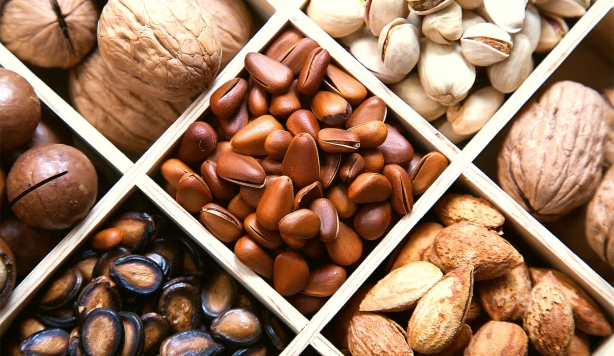A small handful of nuts daily helps replenish essential nutrients. However, some people notice a “oil” smell when they open their nuts. Why do nuts have this smell? How can I choose and store them properly?
My nuts smell like “oil”?
You might have bought low-quality nuts!
Nutritious and delicious nuts are a good source of fat, and many people eat a small handful daily to get their healthy fat intake. Because each nut is rich in oil, oxidation over time when exposed to direct air can cause the oil to smell.
This suggests that nuts that smell like “oil” have either been exposed to stale air for a long time or have been processed in a poor environment.
If the stale smell isn’t due to age, but appears right after opening, you may have purchased low-quality nuts. When nuts begin to develop a stale smell, it also indicates that the quality of the nuts is declining.
How to Choose High-Quality Nuts?
Nuts are a must-have for many health-conscious individuals. How can you choose high-quality nuts? Master these 5 tips and choosing good nuts is easy!
5 Tips for Choosing Good Nuts.
- Choose small packages for optimal safety.
- Select packages that contain a deoxidizing agent to reduce oxidation.
- Select nuts that are light in color, but not too pale. Too dark may indicate high-temperature frying or excessive storage, while too pale may indicate bleaching.
- Select high-quality nuts that are round, plump, and have minimal wrinkles.
- Choose natural, unflavored nuts. If you want to change the flavor later, you can add natural flavorings like honey, maple syrup, sea salt, or dates to your liking.
What are common nuts?
Nuts are generally considered nuts if they have a hard shell, are oily, and have an edible kernel. Common nuts like macadamia nuts, hazelnuts, almonds, pine nuts, cashews, pistachios, peanuts, and walnuts all count as nuts. They are rich in protein and contain unsaturated fatty acids that are beneficial for cardiovascular health.
Peanuts aren’t the only ones that can produce aflatoxin; nuts can, too! Store them properly to avoid ingesting the toxin.
Aflatoxin is easily produced in peanuts, but it’s not just peanuts that can produce it; corn, nuts, and whole grains also pose a risk!
Aflatoxin is difficult to destroy by high temperatures, so the only way to prevent it is to properly store nuts to prevent the growth of aflatoxin.
Storage methods can be categorized into two types
depending on temperature and environment:
Method 1: Sealed and Refrigerated
The best way to store nuts is to seal and refrigerate them. This not only prevents oxidation and preserves their fresh flavor, but also protects against the formation of deadly aflatoxin from moisture.
Sealed, refrigerated packaging can extend the freshness of nuts.
Method 2: Store in small packages at room temperature
If you prefer not to refrigerate, storing nuts at room temperature is also acceptable, as long as they are properly stored. Just remember not to open and close the box frequently when handling the nuts, as this can easily cause them to become damp.
It’s also important to store nuts in a cool, dry, well-ventilated area away from direct sunlight. If you can squeeze out air and seal the nuts in a sealed bag, they’ll stay fresh longer.
What nuts should you avoid?
Fresh nuts have a crisp texture and a natural sweetness. However, nuts that have been stored for too long become soft and taste bitter. Avoid eating these nuts.


Leave a Reply